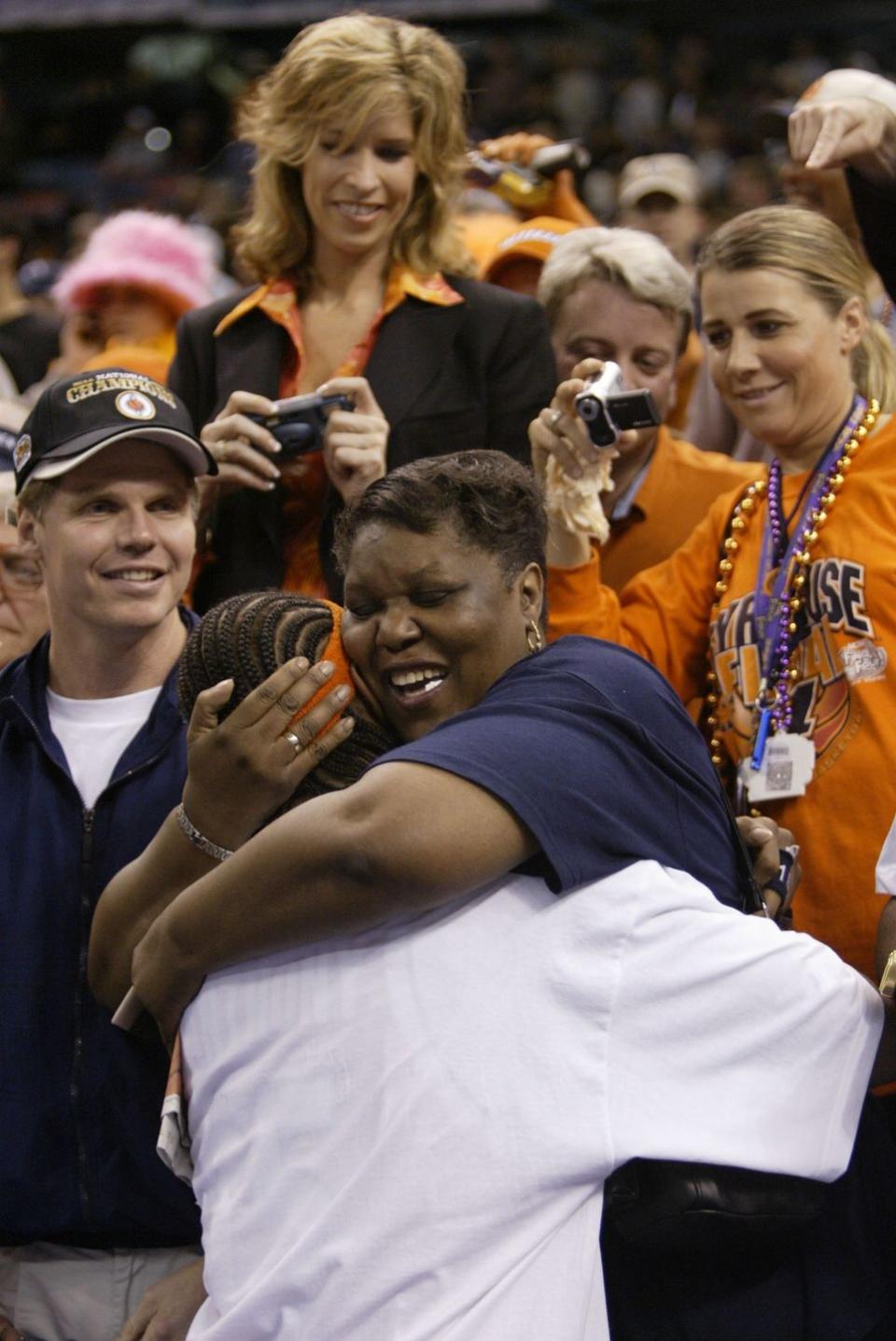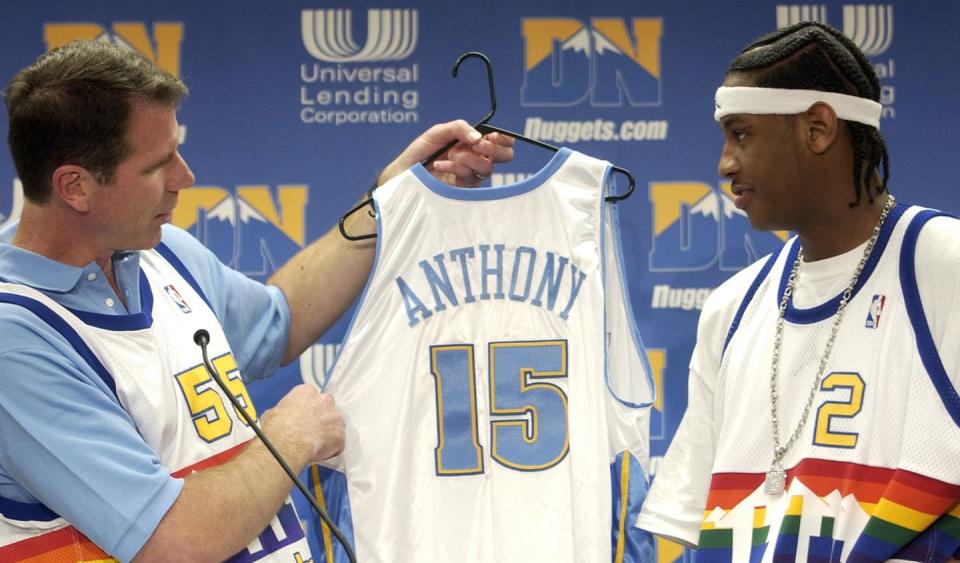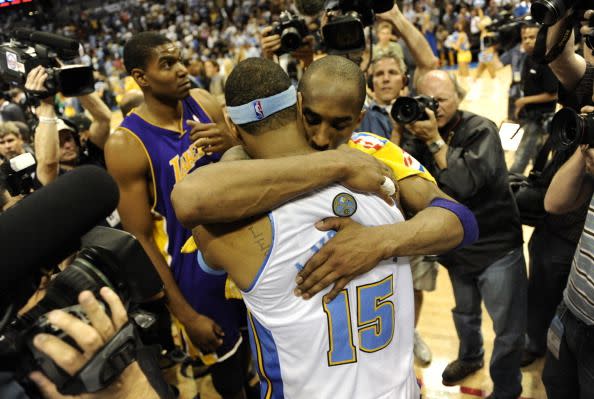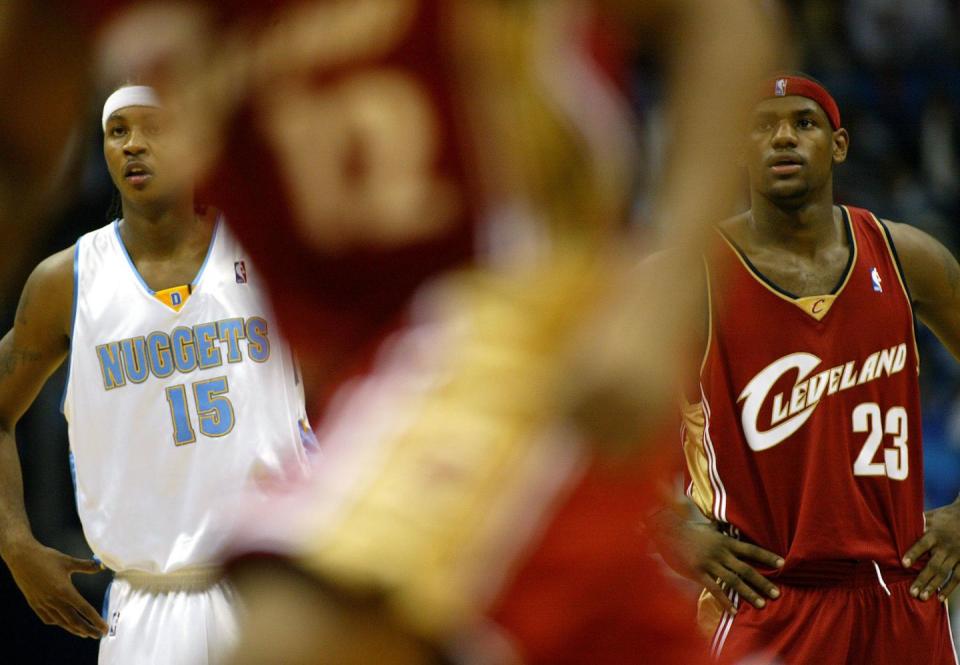Carmelo Anthony Wants His Memoir to Serve as a ‘Bible’ For His Son

Like most of the greats, we only know him by one name: Carmelo. Well-worn on the national consciousness now, it's a moniker that, at one point in the athlete's life—long before he began what'll likely finish as a Hall of Fame career—he never wanted. After moving from Red Hook to Baltimore as a third-grader, Anthony decided that he'd leave behind the name of his father, the social justice activist Carmelo Iriarte, who died when Anthony was just two years old. None of his classmates had ever heard it, no one could even pronounce it, frequently calling him Corolla or Car-mayo instead, so, really, why not become someone else?
"I lied to the school, my teachers, everyone—and told them my name was Tyrone Johnson," Anthony writes in his memoir, When Tomorrows Aren't Promised, out now. When his mom discovered that teachers were, you know, calling the son that she named Carmelo, Tyrone, she said that he'd better cherish the first name of Iriarte, who was a member of the Young Lords, an influential Puerto Rican activist group in the '60s and '70s.
"Dad would probably have all kinds of stories about the Carmelo name, anecdotes that he could've passed down to me, and I could've made them my own," Anthony writes. "But I guess those stories had died with him." He continues, resolute, "Even though I didn't fully understand, I vowed never again to disrespect my given name."

The story, which wrestles with legacy, family, and loss, comes early in When Tomorrows Aren't Promised. It characterizes the memoir of a man who feels like, 18 years into his NBA tenure, someone we're only now beginning to know. Those who pick up a copy solely for revealing tales from the big league may find it curious at first that Anthony forgoes nearly any mention of those near two decades of worthy stardom. (An All-Star 10 times, highlights also include three Olympic Gold Medals and enough points to rank 10th on the all-time NBA scoring list.) Instead, the newly-minted Laker traces his life leading up to the 2003 NBA Draft, with a heavy focus on his childhood between Red Hook and Baltimore, with his family.
It should come as no surprise, given that Anthony has revealed his penchant for honest, no-bullshit conversation in his YouTube series, What's In Your Glass?, but When Tomorrows Aren't Promised tells a remarkably candid story, one defined by the constant racism, violence, and lack of hope Anthony endured in West Baltimore's Murphy Homes. "Sports can't save you," he writes at one point. "People have no problem shooting an athlete."
The result is a moving account that adds visceral new context to the journey of a man who went from taking hits from older kids on the blacktop to playing against a high school-aged LeBron James on national TV. Via a phone interview a week before the release of When Tomorrows Aren't Promised, Anthony said that he aimed to tell a universal story; one which guaranteed that anyone reading could relate to something, anything that he endured. It's a work that's both hilarious and heartbreaking, devastating and inspirational, packed with everyone who ever made a mark on Anthony.
He told us why he kept it to himself until now.
ESQUIRE: Following the story about renaming yourself Tyrone Johnson, you write that your father's name simply wasn't spoken out loud at home as much by the time you were in middle school. That gradual tapering off in mentions is so true when it comes to the names of people we've lost. What did it mean for you to get his story printed?
Carmelo Anthony: It took me a while to tell my father's story, and to talk about him, because I was always receiving new information about him and new stories from different people. I didn't want to leave anything out. I had to really do my due diligence and make sure that I doubled back on conversations with people so everything was aligned. I've never really spoken on my dad or about my dad, even in public. I always kept that inside of me. I always kept that for me. And writing really brought that out of me. And the more that I was writing, the more I was telling the story, it just started flowing even more.
ESQ: Did you have that experience writing the rest of the book?
CA: It was therapeutic. I felt free doing it. Because it's not like you got to make up stories. These are all official, authentic stories. It was just a matter of just tapping back into those time periods and telling those stories during those times.

ESQ: Could you just talk about maybe how it felt just putting yourself back in the shoes of Carmelo at all these different points in your childhood?
CA: That part came easy, because I'm back there. I'm in that neighborhood. I'm around a lot of those same people. We talk all the time. Some of my friends are still there, so it was free-flowing as I get to talking about those things. It was just more conversation like that I was having kind of with myself, but also keeping everybody in my mind as I'm telling these stories. OK, he said this happened. OK, I was right on point about that. Over here, it might not happen on the left side, it happened on the right side, but the story is there. It was healing. But it was also like a bit of nervousness as I was writing, because I'm writing it for everybody now as opposed to just sitting here and telling the story around my friends and family.
ESQ: In the rare times I've had to write about myself, the pressure of people eventually reading it is terrifying, but it does bring something else—something extra—out of you that I'm not sure would come if you were writing in a diary.
CA: Oh yeah, for sure. It definitely wasn't there. Because I tried it. I tried to write journals and they won't work for me.
ESQ: To go back about your dad, we learn so much about the people who end up being figures in your life who give or gave fatherly advice. Even your mother and your sister. Outside the book, how have you compressed all of that knowledge into yourself as a father now?
CA: Well, I try to take my experience and what I've been through as a kid and I try to look back in retrospect like, OK, if I had my dad, what would I want? What would I want to see? How would I want to feel or what I want from him? So I'm able to give that to him as a parent now. I'm able to give that to him. Writing this book is really my Bible to him. It's my blueprint to him. Here's what I had to go through. And you take this and you apply it to your life how you think you want to apply it.

ESQ: I was going to ask you a version of that, because you do describe your childhood beat for beat—and you faced so much violence, racism, and cruelty between Red Hook and Baltimore. What do you hope young kids will learn from the book, reading what you lived through?
CA: Well, for me, I just want people to understand: You don't have to be from Baltimore or be from New York to go through these things. I like to say it's the universal truth, right? It's the greater truth. It has universal appeal so it appeals to everybody and that title, Where Tomorrows Aren't Promised—that goes across the board to any and everybody. You don't have to be from where I'm from to think that tomorrows aren't promised. You could be in the suburbs, you can be here, you can be there, you can be in another country. It's still the same context when you say tomorrows aren't promised.
ESQ: I found your experience with the educational system in this country so interesting over the course of the book—because you start as this extremely curious, intelligent young man entering school. And you show how teachers, and the vice principal especially, take that love of learning away from you.
CA: You know, I wanted to give them a vivid view on: I wasn't a bad student. My grades was good. I went to class. It was just certain things that I've learned along the way, or my upbringing, had got me to question. It was like that was like my downfall a lot of times, because I was questioning the norm. I wasn't doing it purposely. I was searching for answers at that point in time. And I want people to understand that. That's why I contextualized it like that, because I want you to know: I had good intentions when I went into high school to get to school, learn, play ball, have fun, and enjoy. I was just happy go lucky. And then these things start to happen along the way, which almost steals the joy away from me.
ESQ: It did seem like you had fun at Syracuse. We relive the championship, but also, there's all the parties you went to. Can you remember your favorite night out when you were celebrating the national title?
CA: I'll tell you, I just remember I started going to frat parties. I just ended up at frat parties. I'm like, Oh no. How I end up a frat party? But as that year went on, the men's lacrosse team was really good. So I think we won together, like the same year. So it was one big celebration on the campus with the lacrosse team. And they had all the frat houses. So they would invite us to the frat houses. I don't remember exactly the names of it, but in Syracuse, we have bars on Marshall Street and you just go to hit a couple bars. Certain bars we couldn't go to because of [our being underage]. We just stayed on Marshall Street. We hung out there. We went to eat over there. That's what we did. It was fun. I mean, I had so much fun that I didn't want to leave Syracuse.
ESQ: That's something that comes up in a few one-liners throughout the book, that you genuinely never needed or wanted to be in the NBA.
CA: I never really dreamed about making it to the NBA. The NBA was just so far-fetched from where I was at. As you get older, you start hearing the statistics of oh, only one-in-X would make it. And we were like, there's no way we're going to be one of the X that make it in. So I never really thought why I would be in the NBA. Those dreams and those goals came later—I mean, I wasn't against it. You know, I just felt like it was no hope when it came to that.
ESQ: Those are pretty devastating moments in the book too, where you fall into depressed states. You talk about how your childhood conditioned you to not have hope and not have dreams.
CA: I wanted to be open and honest, especially with that point right there, because we didn't have it. And for so long, we have to compress that inside. We couldn't even talk about that. It's like, there was no need to talk about it—not that we couldn't talk about it, it was just no need to talk about it, because it was out of the world, out of this world, out of this atmosphere. We would never make it.

ESQ: The book ends with you on draft night, when you really are still a young man. What do you see looking back at the Carmelo who's on the last page of that book?
CA: In order for me to tell the story that I wanted to tell and get people to get the context of it, I had to end it where I ended it at. Because that's the part of my story that I wanted people to know about. I started it out from the day I was born and ended it the day that I shook David Stern’s hand in June '03, because I just felt like that's the meat and potatoes of who I am. There's no story without that story.
And for so long, I've always kept that to me. Everybody knows you can Google anything Melo after 2003. You can YouTube things. There's a lot of public information out there about me. But nobody knows that story. You know, this is why I'm able to do the things that I do today because of the 18, 19 years. It didn't just happen overnight. So my struggle and my survival and going from hopeless to hope. That's a story that people need to know.
ESQ: One thing I really understood from the book is how much you seem to just connect with every city you play basketball in. You tweeted that Portland made you fall in love with basketball again. What do you think Los Angeles will do for you, just as a man?
CA: I've been in LA, I would say, almost 15 years now. So it's an easy transition for me to make. As if I'm going home. I'm going back home. I'm going to my house. So it ain't like I got to find a new place and shift this and that. No, it's just I'm home. But having LA at this point in time in my career will be totally different as opposed to if I had LA earlier in my career. And I say that because I have a different mindset. I have a different approach to just life, and what I do, and how I conduct myself, and how I operate. I just have a different way of viewing things at this age. So it makes LA more reserved and laid back. And you know what you have to do. And I've felt that kind of peace in every city that I've been in.

ESQ: Earlier in your career would not have been the right time to be playing there?
CA: No, I don't think so, because I was already established. I was already established in Denver. I was already established in New York. These were my cities. Denver was mine, New York was mine. These are my cities so, you know, being in LA, that was somebody else’s city at the time. That was Kobe's city. That was my brother's city. So, it probably wouldn't have worked back then, me being in LA at that point in time in my career.
ESQ: Knowing that you're going to the Lakers—and reading about your first two big encounters with LeBron James—it really does feel perfect that you ended up together now.
CA: This is divine, I would say. This was manifested. And you know, I always say, timing is everything. It might not be on time, but it's going to be the right time. And I truly believe in that. And I think now is the right time.
ESQ: I know that you said that everything is public information after 2013, but it did have me wanting more. Especially because we do get a little bit to the NBA when you tell the Larry Brown and Darko Miličić story from your perspective.
CA: Yeah. Because at this point in time, Darko was not even in the picture. We had just won the National Championship in college. So I'm back in Baltimore, hanging with my friends and family. The NBA is going on. It's the NBA playoffs. So me and my manager to this day, we drove up there to Philly to watch Detroit play against Philly. And we knew that the NBA lottery was coming up. We wanted to go to the game. We really wanted to see [Allen Iverson] work in Detroit. But it was so much surrounding Larry Brown. He was coaching Philly but then he committed to Detroit. You know, when they told me that they were taking me at the second pick, I went back home happy.

I'm at home, driving down 95, we'd gone to Detroit and Darko was not even... I never even heard of him at that point in time. He's not even around. And it was no disrespect to him. At that point, it was just me and LeBron. I'm like, who is this guy? I want to just go with him and go work out and just train with him. I need people to see us together. And it just never happened. I never came across paths with him. So at that point, I just wasn't worried about it. I just knew Detroit had guaranteed me. And when it didn't happen, that took me back to the things that I talk about in the book, because it was another case of disappointment. It was another case of losing something.
ESQ: But at the same time, I do love how you describe your attitude—that you do try to lift other people up and keep hope. You could have gotten bitter, you could have been an asshole, you know? I think it's hard to not do that.
CA: Yeah, I know. I mean, especially at that time, it's hard. It's hard. And I didn't know it. Honestly, I didn't know that it was that hard.
You Might Also Like

 Yahoo Sports
Yahoo Sports 